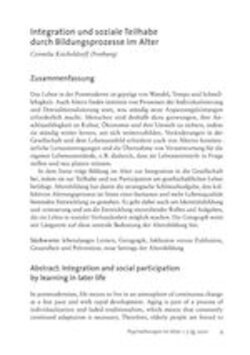15 Seiten, PDF-E-Book
Erschienen: März 2010
Bestell-Nr.: 20226
abonnieren
Cornelia Kricheldorff
Integration und soziale Teilhabe durch Bildungsprozesse im Alter (PDF)
Psychotherapie im Alter 2010, 7(1), 9-23
Sofortdownload
Dies ist ein E-Book. Unsere E-Books sind mit einem personalisierten Wasserzeichen versehen,
jedoch frei von weiteren technischen Schutzmaßnahmen (»DRM«).
Erfahren Sie hier mehr zu den Datei-Formaten.
Das Leben in der Postmoderne ist geprägt von Wandel, Tempo und Schnelllebigkeit. Auch Altern findet inmitten von Prozessen der Individualisierung und Detraditionalisierung statt, was ständig neue Anpassungsleistungen erforderlich macht. Menschen sind deshalb dazu gezwungen, ihre Anschlussfähigkeit an Kultur, Ökonomie und ihre Umwelt zu sichern, indem sie ständig weiter lernen, um sich weiterzubilden. Veränderungen in der Gesellschaft und dem Lebensumfeld erfordern auch von Älteren kontinuierliche Lernanstrengungen und die Übernahme von Verantwortung für die eigenen Lebensumstände, z. B. dadurch, dass sie Lebensentwürfe in Frage stellen und neu planen müssen. In dem Sinne trägt Bildung im Alter zur Integration in die Gesellschaft bei, indem sie zur Teilhabe und zur Partizipation am gesellschaftlichen Leben befähigt. Altersbildung hat damit die strategische Schlüsselaufgabe, den kollektiven Alterungsprozess im Sinne einer humanen und mehr Lebensqualität bietenden Entwicklung zu gestalten. Es geht dabei auch um Identitätsbildung und -erneuerung und um die Entwicklung sinnstiftender Rollen und Aufgaben, die ein Leben in sozialer Verbundenheit möglich machen. Die Geragogik weist seit Längerem auf diese zentrale Bedeutung der Altersbildung hin.
Abstract:
In postmodernism, life means to live in an atmosphere of continuous change at a fast pace and with rapid development. Aging is part of a process of individualisation and faded traditionalism, which means that constantly continued adaptation is necessary. Therefore, elderly people are forced to stay connected with culture, economics and their environment by continuous learning and educating themselves. Due to the changes in society and social environments, elderly people are required learn continuously and take over responsibility for their own living conditions, for instance, by analysing their conceptions of life and planning new strategies. In this sense, education contributes in part to ensure integration into society by enabling older people to equal participation. Therefore, educational gerontology has the strategic key-task to design the collective aging-process in the sense of a development which offers a richer and more humane quality of life. This also concerns the building and renewal of identity, and the development of meaningful roles and tasks that make a life in social solidarity possible. For a long time geragogy has emphasized the central importance of educational gerontology.
Abstract:
In postmodernism, life means to live in an atmosphere of continuous change at a fast pace and with rapid development. Aging is part of a process of individualisation and faded traditionalism, which means that constantly continued adaptation is necessary. Therefore, elderly people are forced to stay connected with culture, economics and their environment by continuous learning and educating themselves. Due to the changes in society and social environments, elderly people are required learn continuously and take over responsibility for their own living conditions, for instance, by analysing their conceptions of life and planning new strategies. In this sense, education contributes in part to ensure integration into society by enabling older people to equal participation. Therefore, educational gerontology has the strategic key-task to design the collective aging-process in the sense of a development which offers a richer and more humane quality of life. This also concerns the building and renewal of identity, and the development of meaningful roles and tasks that make a life in social solidarity possible. For a long time geragogy has emphasized the central importance of educational gerontology.
Cornelia KricheldorffS. 9–23Integration und soziale Teilhabe durch Bildungsprozesse im Alter (PDF)
Psychotherapie im Alter 2010, 7(1), 9-23Elisabeth Bubolz-LutzS. 25–41Bildung im Alter. Eine gestalttherapeutische Perspektive (PDF)
Psychotherapie im Alter 2010, 7(1), 25-41Solveig HaringS. 43–53Lernen nach der Erwerbsphase aus bildungswissenschaftlicher Sicht (PDF)
Psychotherapie im Alter 2010, 7(1), 43-53Sabine Baumann & Karl Ermert S. 55–66Kultur und kulturelle Bildung in der alternden Gesellschaft. Überblick und Aussichten (PDF)
Psychotherapie im Alter 2010, 7(1), 55-66Julia SteinfortS. 67–78Individuelle Identitätsentwicklung im Alter im Kontext freiwilligen Engagements. Ergebnisse einer empirischen Studie (PDF)
Psychotherapie im Alter 2010, 7(1), 67-78Angelika TrillingS. 79–91Freiwilligenengagement und Weiterbildung. Das Projekt GRIPS - kompetent im Alter (PDF)
Psychotherapie im Alter 2010, 7(1), 79-91Johannes KippS. 93–101Lernen im Alter - warum und wozu?. Eine kritische (Selbst-)Reflexion (PDF)
Psychotherapie im Alter 2010, 7(1), 93-101Monika Wachter, Marta Heyder, Susanne Kraft & Wolf D. Oswald S. 103–106Selbstständig im Alter. Entstehungsgeschichte und Ausbildungskurse der SimA-Akademie e.V. in Nürnberg (PDF)
Psychotherapie im Alter 2010, 7(1), 103-106Dietmar KösterS. 107–112Das Forschungsinstitut Geragogik (FoGera) (PDF)
Psychotherapie im Alter 2010, 7(1), 107-112
Psychotherapie im Alter 2010, 7(1), 9-23Elisabeth Bubolz-LutzS. 25–41Bildung im Alter. Eine gestalttherapeutische Perspektive (PDF)
Psychotherapie im Alter 2010, 7(1), 25-41Solveig HaringS. 43–53Lernen nach der Erwerbsphase aus bildungswissenschaftlicher Sicht (PDF)
Psychotherapie im Alter 2010, 7(1), 43-53Sabine Baumann & Karl Ermert S. 55–66Kultur und kulturelle Bildung in der alternden Gesellschaft. Überblick und Aussichten (PDF)
Psychotherapie im Alter 2010, 7(1), 55-66Julia SteinfortS. 67–78Individuelle Identitätsentwicklung im Alter im Kontext freiwilligen Engagements. Ergebnisse einer empirischen Studie (PDF)
Psychotherapie im Alter 2010, 7(1), 67-78Angelika TrillingS. 79–91Freiwilligenengagement und Weiterbildung. Das Projekt GRIPS - kompetent im Alter (PDF)
Psychotherapie im Alter 2010, 7(1), 79-91Johannes KippS. 93–101Lernen im Alter - warum und wozu?. Eine kritische (Selbst-)Reflexion (PDF)
Psychotherapie im Alter 2010, 7(1), 93-101Monika Wachter, Marta Heyder, Susanne Kraft & Wolf D. Oswald S. 103–106Selbstständig im Alter. Entstehungsgeschichte und Ausbildungskurse der SimA-Akademie e.V. in Nürnberg (PDF)
Psychotherapie im Alter 2010, 7(1), 103-106Dietmar KösterS. 107–112Das Forschungsinstitut Geragogik (FoGera) (PDF)
Psychotherapie im Alter 2010, 7(1), 107-112

